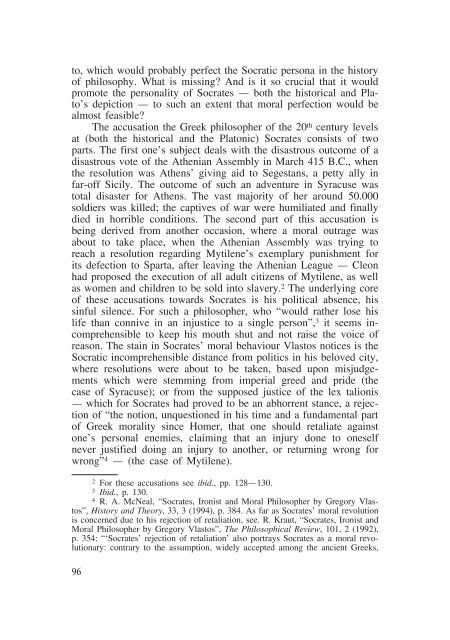You also want an ePaper? Increase the reach of your titles
YUMPU automatically turns print PDFs into web optimized ePapers that Google loves.
to, which would probably perfect the Socratic persona in the history<br />
of philosophy. What is missing? And is it so crucial that it would<br />
promote the personality of Socrates — both the historical and Plato's<br />
depiction — to such an extent that moral perfection would be<br />
almost feasible?<br />
The accusation the Greek philosopher of the 20 th century levels<br />
at (both the historical and the Platonic) Socrates consists of two<br />
parts. The first one's subject deals with the disastrous outcome of a<br />
disastrous vote of the Athenian Assembly in March 415 B.C., when<br />
the resolution was Athens' giving aid to Segestans, a petty ally in<br />
far-off Sicily. The outcome of such an adventure in Syracuse was<br />
total disaster for Athens. The vast majority of her around 50.000<br />
soldiers was killed; the captives of war were humiliated and finally<br />
died in horrible conditions. The second part of this accusation is<br />
being derived from another occasion, where a moral outrage was<br />
about to take place, when the Athenian Assembly was trying to<br />
reach a resolution regarding Mytilene's exemplary punishment for<br />
its defection to Sparta, after leaving the Athenian League — Cleon<br />
had proposed the execution of all adult citizens of Mytilene, as well<br />
as women and children to be sold into slavery. 2 The underlying core<br />
of these accusations towards Socrates is his political absence, his<br />
sinful silence. For such a philosopher, who “would rather lose his<br />
life than connive in an injustice to a single person", 3 it seems incomprehensible<br />
to keep his mouth shut and not raise the voice of<br />
reason. The stain in Socrates' moral behaviour Vlastos notices is the<br />
Socratic incomprehensible distance from politics in his beloved city,<br />
where resolutions were about to be taken, based upon misjudgements<br />
which were stemming from imperial greed and pride (the<br />
case of Syracuse); or from the supposed justice of the lex talionis<br />
— which for Socrates had proved to be an abhorrent stance, a rejection<br />
of “the notion, unquestioned in his time and a fundamental part<br />
of Greek morality since Homer, that one should retaliate against<br />
one's personal enemies, claiming that an injury done to oneself<br />
never justified doing an injury to another, or returning wrong for<br />
wrong" 4 — (the case of Mytilene).<br />
2 For these accusations see ibid., pp. 128—130.<br />
3 Ibid., p. 130.<br />
4 R. A. McNeal, “Socrates, Ironist and Moral Philosopher by Gregory Vlastos",<br />
History and Theory, 33, 3 (1994), p. 384. As far as Socrates' moral revolution<br />
is concerned due to his rejection of retaliation, see. R. Kraut, “Socrates, Ironist and<br />
Moral Philosopher by Gregory Vlastos", The Philosophical Review, 101, 2 (1992),<br />
p. 354: “‘Socrates' rejection of retaliation' also portrays Socrates as a moral revolutionary:<br />
contrary to the assumption, widely accepted among the ancient Greeks,<br />
96

















